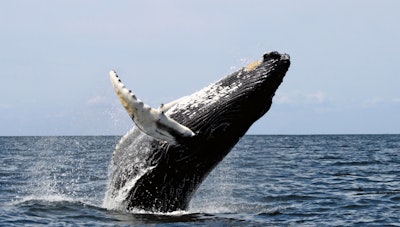
NEW ORLEANS (AP) — With as few as about a dozen of the mammals left, federal regulators say a unique species of baleen whales in the Gulf of Mexico about 70 miles off the Florida  Panhandle may be threatened with extinction and could get special protection from federal regulators.
Panhandle may be threatened with extinction and could get special protection from federal regulators.
In April, the National Marine Fisheries Service announced it was looking at granting endangered or threatened status to the small population of Bryde's whales (pronounced Bru-dihs whales) that live in the DeSoto Canyon region, a deep-water area about 50 miles east of the site of BP's catastrophic oil spill five years ago.
The Interior Department has begun to open up a sliver of the eastern Gulf to drilling operations near the whales' habitat. Most of the eastern Gulf remains off-limits to drilling due to a moratorium.
Bryde's whales are found in tropical waters around the world, but the population in the Gulf has been deemed likely a genetically separate species from other baleen whales. Scientists believe there are fewer than 50 of the whales in the Gulf. A recent stock assessment found about 15 of the animals.
"Whenever you have a species down in their tens, it's spooky in terms of their long-term survival," said John Hildebrand, a whale specialist at the Scripps Institution of Oceanography at the University of California-San Diego.
A petition was filed last year by the Natural Resources Defense Council seeking protection for the whales. The NRDC is an environmental group based in New York City that specializes in pressing for more protection of wildlife under federal conservation laws.
"There are so few of these animals left there is no doubt that they are at risk of extinction," said Giulia C.S. Good Stefani, an NRDC attorney. "They really are down to the last individuals."
She said that "the Gulf of Mexico is an industrialized body of water" and the threats facing the animals "are a perfect storm."
Among the threats are being struck by passing ships and oil and gas activities. For instance, a lactating whale was struck and killed by a ship in 2009, according to federal records.
Scientists also say seismic surveys done by powerful air-guns in oil and gas exploration and the general noise of ship traffic interfere with the whales' system of underwater communication. Other threats are overfishing, ocean acidification and pollution from oil spills.
Jennie Lyons, a spokeswoman for the National Marine Fisheries Service, said the whales already are protected under the Marine Mammal Protection Act, which makes it illegal to intentionally harm the creatures.
But obtaining status as threatened or endangered would prompt regulators to establish critical habitat for the whales and develop a recovery plan. Also, more consideration for the conservation of the whales would have to take place before handing out oil drilling permits and authorizing other activities.
Scientists speculate other Bryde's whales may have been found in western portions of the Gulf but the expansion of offshore oil and gas drilling off the coasts of Louisiana and Texas since the 1950s may have pushed them out of those waters.
"The jury's still out on that," said Kait Frasier, a researcher with the Scripps Institution of Oceanography.
She saw some of the Bryde's whales during a research trip to better understand the mammals in 2012. "They're very active animals, and they're very graceful," she said.
Unlike many other whales, Bryde's whales do not make a lot of underwater sounds and do not make long migrations.
Five other whale species in the Gulf have been listed as endangered since 1970. They are the blue whale, finback whale, humpback whale, sei whale and sperm whale. Of those species, Hildebrand said sperm whales are the only ones found in large numbers in the Gulf. A recent stock assessment found about 1,665 sperm whales in the Gulf.
In all, there are 17 species listed as threatened or endangered in the Gulf.





















